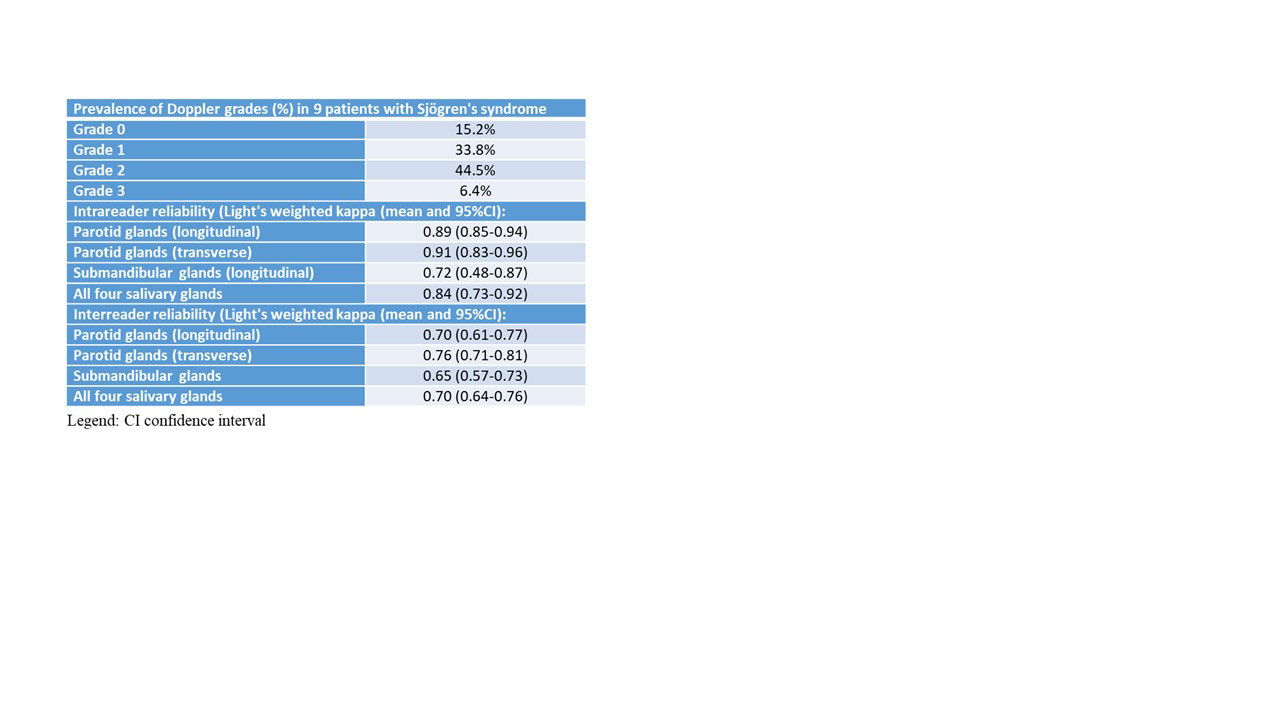Session Information
Session Type: Poster Session (Sunday)
Session Time: 9:00AM-11:00AM
Background/Purpose: The vascularization of salivary glands (SG) in Sjögren’s syndrome (SS) has not been extensively studied by imaging methods, and currently no agreement exists on how this should best be evaluated. Color Doppler (CD) ultrasonography (US) might represent a good tool for the assessment of vascularization in SS.
The aim of the exercise of the OMERACT Sjögren US subtask group was to test the reliability of SG vascularization assessment in SS patients using a consensual developed semiquantitative CD US scoring system.
Methods: Nine sonographers participated in the reliability exercise, evaluating the vascularization of bilateral parotid and submandibular glands in 9 SS patients using CD US with previously standardized and optimized Doppler settings. The participants were not allowed to modify the settings while scanning. The superficial lobe of parotid glands was scanned in both longitudinal and transverse plane, while submandibular glands were scanned in longitudinal plane only. A previously agreed four grade semiquantitative score was applied: Grade 0, no visible vascular signals; Grade 1, focal, dispersed vascular signals; Grade 2, diffuse vascular signals detected in less than 50% of the gland; Grade 3, diffuse vascular signals in more than 50% of the gland. Intrareader and interreader reliability of grading SG was determined by Light’s weighted kappa analysis.
Results: Light’s weighted kappa of intrareader and interreader reliability showed good to excellent agreement. Data are presented in Table 1.
Conclusion: The consensual CD US scoring for the evaluation of SG vascularization in SS showed a good interreader reliability and excellent intrareader reliability. Next step should be further testing for clinical application in a larger group of SS patients and controls. In addition, a potential correlation between SG structural changes seen on B-mode US and vascularization should be studied.
To cite this abstract in AMA style:
Hocevar A, Jousse-Joulin S, Perko N, FINZEL S, HANOVA P, IAGNOCCO A, Inanc N, NAREDO E, SCHMIDT W, Terslev L, ZABOTTI A, Tomšič M, Bruyn G. Assessing the Vascularization of Salivary Glands in Patients with Sjögren’s Syndrome – An OMERACT Ultrasound Group Reliability Exercise [abstract]. Arthritis Rheumatol. 2019; 71 (suppl 10). https://acrabstracts.org/abstract/assessing-the-vascularization-of-salivary-glands-in-patients-with-sjogrens-syndrome-an-omeract-ultrasound-group-reliability-exercise/. Accessed .« Back to 2019 ACR/ARP Annual Meeting
ACR Meeting Abstracts - https://acrabstracts.org/abstract/assessing-the-vascularization-of-salivary-glands-in-patients-with-sjogrens-syndrome-an-omeract-ultrasound-group-reliability-exercise/

